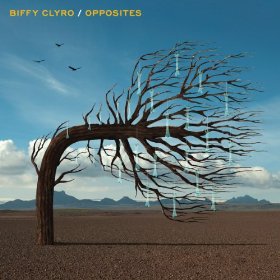Biffy Clyro: Opposites
 Biffy Clyro
Biffy Clyro
Opposites
(14th Floor Records)
![]()

In these days of music streaming and 99-cent tracks for individual purchase, the presentation of “the album” has become increasingly a thing of the past. Thank God for the eccentric minds of Biffy Clyro. These Scottish rockers have been defiantly weird from the start, but they’ve now polished their sound enough to sound a little tighter, friendlier and more cohesive. Opposites is much more than a concept album: it is a pair of albums that complement each other perfectly.
The first album, The Sand at the Core of Our Bones, is more introverted than its companion. The focus is more internal, circling around themes of longing and past turmoil. When vocalist Simon Neil sings, “The past never really dies/I don’t think we even try/There’s no different from where we wake or where we die” on “Sounds Like Balloons,” it seems to speak to the album’s whole tone. So too does Biffy’s sound seem on the cusp of something. The band’s origins are frenetic, a clash of indie and sweaty metal. Here they are much tighter and refined, though that doesn’t stop dirty solos from popping up in songs like “Black Chandelier.”
The second album, The Land at the End of Our Toes, is much more traditional Biffy in how inventive it is, but that creativity is merged with more optimistic songs. Sure, you have bagpipes on “Stingin’ Belle” and horns with Latin flair on “Spanish Radio,” but the lyrics on Opposites are some of Biffy’s most straightforward ever. Sentiments like “I will sing for three days/to prove what you mean to me” (“Trumpet or Tap”) and “I’d rather kiss the ground/than kiss a starless sky” (“Skylight”) are brilliantly clear and beautiful progress from a band with previous songs like “Get Fucked Stud.” I’m a fan of the old material just as much as their latest output, but I’m glad Biffy are finding their voice and some resonance with an international crowd.
So get some headphones, set aside an hour and a half, and let yourself indulge in Opposites. You won’t regret it. Unless of course you get the one-disc version, in which case you’re only cheating yourself out of the full balance of two well crafted, juxtaposing albums.











